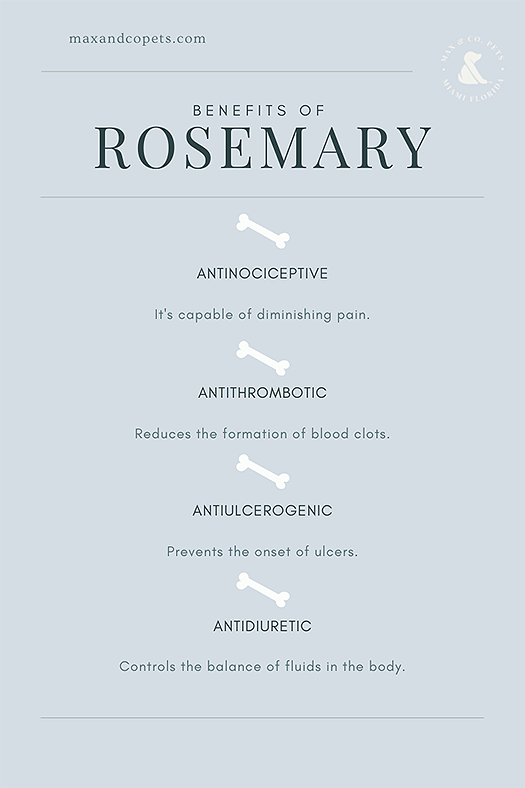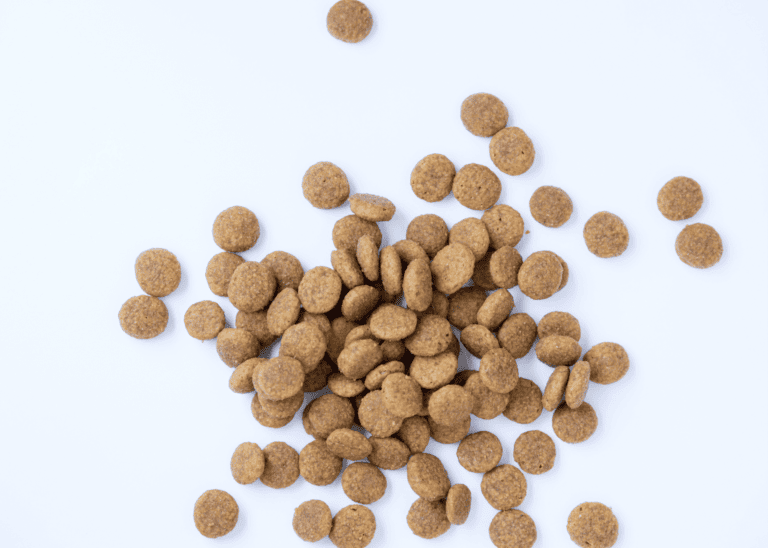
Can dogs eat rosemary? You might be wondering this if you’re a dog owner. Believe it or not, rosemary is actually a healthy herb for dogs to eat! In this post, we’ll discuss the benefits of rosemary for dogs.
But before we do, let’s get some background.

What is Rosemary?
Rosemary or Rosmarinus officinalis, is an evergreen, aromatic herb native to the Mediterranean region. Its thin yet pungent scent and flavor is similar to Eucalyptus. Grown mostly in warm climates, there have been many uses of rosemary throughout history both in the culinary and medicinal world. Rosemary has been used in perfumes, body lotions, and cosmetics.

Herbalists have used rosemary to open capillaries and treat inflammation and it has been known to improve memory and reduce anxiety.
In the dog food industry, rosemary has been used as a flavoring in some commercial dog food for more than 20 years. Most recently, it has been used as a natural preservative. In fact, it’s the antioxidant content in rosemary that functions to protect dietary fat and certain vitamins from oxidation, assisting in prolonging the shelf life of food.
What are the benefits of Rosemary for Dogs?

Rosemary is a stimulating herb comprised of antioxidant and anti-inflammatory compounds. Its actions are antiviral, antibacterial, and antimicrobial. It’s interesting to find all these properties so often in nature, isn’t it?
Some of the health benefits of rosemary for dogs include:
- Improved brain function
- Increased energy levels
- Better digestion
- Stronger immune system
NIH studies have found rosemary to also have the following medicinal properties:
- Antinociceptive – meaning it’s capable of diminishing pain
- Antithrombotic – reduces the formation of blood clots
- Antiulcerogenic – prevents the onset of ulcers
- Antidiuretic – controls the balance of fluids in the body
Rosemary is a natural way to reduce your dog’s fasting glucose levels. In fact, a recent study has indicated dietary fortification with rosemary and basil leaves powder “may be used as a promising clinic-nutritional management tool for the prevention and control of DM [diabetes mellitus] in Rottweiler dogs.”
Can dogs eat rosemary & how much rosemary is safe?
Rosemary extracts from dried leaves of Rosmarinus officinalis L., are safe up to the maximum use levels of 300 mg/kg complete feed for dogs. Keep in mind that is an undiluted amount. Herbalists recommend 1/8 teaspoon of a tincture per 20 pounds of body weight can be added to your dog’s food.
Studies of rosemary dosages conducted with rodents have shown rosemary extract to be tolerated at high levels. Although no studies have been conducted on dogs for ethical reasons, based on the rodent studies, rosemary has been presumed to be safe.
Can rosemary trigger seizures in dogs?
If you type “rosemary and seizures in dogs” right now in your Google search bar it will reveal several articles indicating a possible link between rosemary and seizures in dogs. Some of these articles go to the extreme of saying that there is a direct link or that “it has been shown” that rosemary causes seizures in dogs.
I’ve tried researching this extensively and have found no scientific studies showing a relationship between rosemary and seizures in canines. Does this mean they don’t exist? The truth is, I don’t know. But what I have found instead is an extensive list of articles and studies showing all of its benefits.
With that said, your dog can, however, have an allergy to rosemary just as he can have an allergy to any other food. Food allergy symptoms may include:
- Upset stomach
- Itchy skin and paws
- Hair loss
- Rash
- Obsessive licking/chewing of feet
- Vomiting
- Diarrhea
- Swelling of the face, ears, lips, eyelids, or earflaps
Rosemary and Dog Cancer
A great piece to note is a recent study involving rosemary leaf extract and turmeric extract and their efficacy in battling certain canine tumors. A combination of rosemary leaf extract (rich in carnosic acid) and turmeric extract (rich in curcuminoids) have been shown to be cytotoxic and reduce how quickly cancer cells copy themselves in canine mast cell tumors, mammary carcinoma (or tumors of the mammary glands), and osteosarcoma (bone tumor) cell lines. If you are interested, links to the studies may be found here:
Cellular effects of a turmeric root and rosemary leaf extract on canine neoplastic cell lines
[RELATED POST: TURMERIC FOR DOGS, EVERYTHING YOU NEED TO KNOW]
Other Uses for Rosemary
Flea and Tick Repellant
Rosemary oil is a great natural flea and tick repellant. We have used it in our household for years and can attest to its efficacy. We love Wondercide’s Rosemary Flea & Tick Spray. Their active ingredients are cedarwood oil, rosemary oil, coconut and/or palm oil, and sesame oil. It’s safe for dogs and cats of all ages.
Another great product on the market is kin+kind Flea and Tick Spray. It contains lemongrass, cedarwood oil, and rosemary oil as its active ingredients.
Digestion Booster
As we know, rosemary helps dogs with digestion by increasing the production of bile. Bile is a digestive juice that helps break down fats in the small intestine. This is important because it can help dogs absorb more nutrients from their food. Because of its anti-inflammatory properties, rosemary can help reduce inflammation in the gut and thus improve digestion.
I was surprised by the many benefits rosemary offers to dogs and its ability as an anti-inflammatory. It’s exciting to see how it can help dogs with serious diseases like cancer and diabetes. If you’re looking for a natural way to improve your dog’s health, rosemary may be the herb for you. Talk to your veterinarian about adding rosemary to your pet’s diet. And check your dog’s food, he may be already consuming it!














